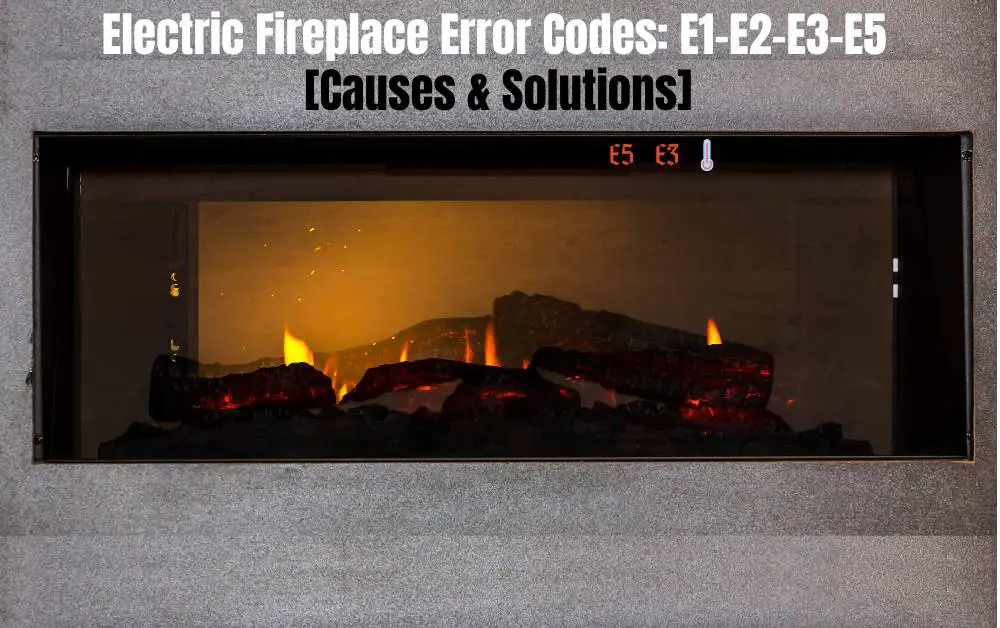Electric fireplaces have become increasingly popular in the quest for coziness and energy-efficient heating solutions. Their ability to evoke the warmth and ambiance of a traditional fireplace without the hassle of wood or gas has made them a sought-after addition to many homes. However, as homeowners consider installing these stylish and convenient appliances, a common question arises: Do electric fireplaces need their own circuit?
Overview
While not all electric fireplaces mandate a dedicated circuit, it can offer several advantages. A dedicated circuit ensures the fireplace receives a consistent and uninterrupted power supply, minimizing the risk of overloading the circuit. This is particularly important in households where multiple appliances share the same electrical circuit.
Electric Fireplaces Power Consumption and Amperage
Electric fireplaces typically vary in power consumption, and the amperage they draw depends on their size and features. Smaller units may require 120 volts and remove around 10-15 amps, while more extensive and advanced models could demand 240 volts and pull higher amperage.
Do Electric Fireplaces Need Their Own Circuit?
Electric fireplaces do not require their own dedicated circuit. They can typically be connected to standard household circuits. However, a dedicated circuit ensures the fireplace receives a consistent and uninterrupted power supply, minimizing the risk of overloading the circuit.
Some electric fireplaces may not explicitly require a dedicated circuit, doing so enhances safety by reducing the risk of electrical issues, such as tripped breakers or overloaded circuits. A dedicated circuit minimizes the likelihood of electrical disruptions, ensuring your electric fireplace’s consistent and reliable operation.
In addition to safety considerations, a dedicated circuit can contribute to your electric fireplace’s energy efficiency and longevity. By providing a reliable power source, the risk of voltage fluctuations and power surges is reduced, which can positively impact the lifespan and performance of the appliance.
Related Post: Can You Plug an Electric Fireplace into a Power Strip?
Advantages of Using Dedicated Circuit for Electric Fireplace
Using a dedicated circuit for an electric fireplace offers several advantages, ensuring safety, efficiency, and optimal performance. Here are some key advantages:
-
Safety: One of the primary benefits of a dedicated circuit is enhanced safety. Electric fireplaces typically draw a significant amount of power, and a dedicated circuit helps prevent overloading. This reduces the risk of electrical fires, short circuits, and other safety hazards.
-
Consistent Performance: A dedicated circuit ensures a stable and consistent power supply to the electric fireplace. This is crucial for the optimal performance of the appliance. Without shared power with other devices on the same circuit, there is less chance of voltage drops or fluctuations affecting the fireplace’s functionality.
-
Preventing Overloading: Electric fireplaces can have high power requirements. Plugging them into a circuit with other high-power appliances may lead to overloading, tripping the circuit breaker. With a dedicated circuit, you can avoid overloading issues and enjoy uninterrupted operation of the electric fireplace.
-
Code Compliance: In many regions, electrical codes and regulations may require certain high-power appliances, including electric fireplaces, to be on dedicated circuits. Adhering to these codes ensures compliance with safety standards and can prevent potential legal and insurance issues.
-
Convenience: Having a dedicated circuit for your electric fireplace adds comfort. You won’t have to worry about turning off other appliances on the same circuit to use the fireplace, and you can operate the fireplace independently without affecting other electrical devices in your home.
-
Reduced Interference: Shared circuits can sometimes lead to interference between devices. Using a dedicated circuit for the electric fireplace minimizes the chances of interference or disruptions caused by other appliances on the same circuit.
-
Future Expansion: If you plan to add more electrical appliances or devices, having a dedicated circuit for the electric fireplace leaves room for expansion without overloading the existing circuit.
Related Post: Electric Fireplace Code Requirements
Installation Considerations
Assessing your existing electrical infrastructure is essential before deciding whether to allocate a dedicated circuit for your electric fireplace. Using an existing course might be feasible if your home’s electrical system can accommodate the additional load without compromising safety.
However, a dedicated circuit is a prudent choice for more enormous fireplaces or homes with limited electrical capacity.
Affiliate Disclosure: Fireplaceadviser.com is a participant in the Amazon Services LLC Associates Program. We may earn a commission when you click on certain links on this site and purchase.

Hello!! I am Jamal Khan. I often fix my home electric heaters and gas stove problems and research the common issues in the heating units to improve my knowledge and expertise. The aim of establishing fireplaceadviser.com is to share my expertise and knowledge with my audience.









